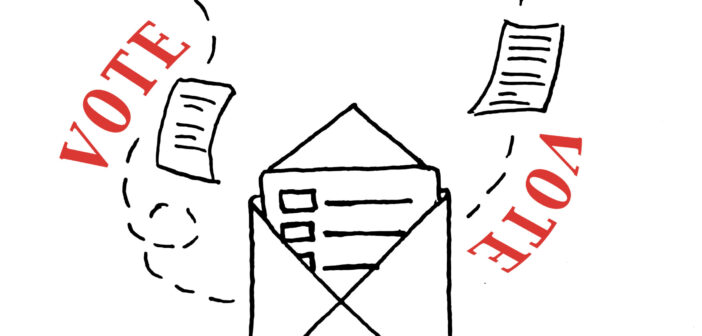Late last month, the Pennsylvania Commonwealth Court ruled that Act 77, which put in place what is commonly called “no excuse mail-in voting,” is unconstitutional.
This decision was 3-2 along party lines, with the three Republican judges voting that the law is unconstitutional and the changes it makes to voting procedures require an amendment to the constitution. The Wolf administration is appealing to the Supreme Court of Pennsylvania.
The state Supreme Court is scheduled to begin hearing arguments on Gov. Tom Wolf’s appeal on March 8, but the Commonwealth Court updated on Wednesday, Feb. 16 that their decision to strike down mail-in voting will go into effect on March 15.
In late 2019, Gov. Wolf signed Act 77 into law which increased accessibility to vote. Act 77 contained significant changes to Pennsylvania’s election law, and the legislation had been carefully negotiated between Democrat Gov. Wolf and the Republican-led Pennsylvania legislature.
Fast forward slightly over one year later: Former President Donald Trump is not reelected in the 2020 presidential election and there is outcry that President Joe Biden didn’t legitimately win the election. Act 77 becomes a target for many of the Republican legislators who had previously voted for the bill — they are now concerned the new voting law opens the door to voter fraud.
Republican lawmakers went to court, arguing that Act 77 is unconstitutional. Of the 14 lawmakers involved in the suit, 11 of them had voted for the bill a year earlier.
Brian Fife, professor and chair of Lehigh’s political science department, said that Act 77 excused people from having to provide a reason why they can’t vote in person, such as being out of town on Election Day.
“During the pandemic (and before vaccines were widely available), this proved helpful for people wanting to vote by mail to avoid lines of people on election day. Under Act 77, people could permanently request mail-in ballots, so a voter would not need to request a mail-in ballot each year,” Fife said. “A mail-in ballot could become that voter’s default way of voting.”
The law included other changes as well. One being the deadline to register to vote in Pennsylvania went from 30 days before an election to 15 days.
Jennifer Jensen, the deputy provost for academic affairs and political science professor at Lehigh, said the act has several implications for Pennsylvania voters.
“Some people have more barriers to voting in person than others. For example, if you don’t have a car, it is harder for many people to get to their polling place — particularly if they don’t have good public transit or live in a rural area,” Jensen said.
Lehigh students who are not from Pennsylvania and wish to vote in their home state are not affected by the removal of Act 77.
Matt Ziarnik, ‘24G, said the choice to vote in person or by mail is helpful in different ways to different people.
“I think I would prefer the option to vote in person,” Ziarnik said. “But I do think people who are traveling or aren’t able to get themselves to a polling place should have the option to vote by mail.”
Jensen said he believes that this lawsuit is lacking evidence of any election being meaningfully affected by voter fraud and it serves to politicize the election process in the eyes of many voters.
“When voters see the voting process as unfair or politically biased, it undercuts their faith in voting,” Jensen said. “This lack of faith in voting, which is a fundamental democratic process, weakens our democratic system of government.”
According to Jensen, a justification that many lawmakers have used in repealing this law is that voting restrictions are needed to ensure the integrity of the electoral process.
Fife believes that restricting the right to vote will have an impact on citizens in a negative way.
“Elected officials should be doing all they can to make voting more facilitative for their constituents, not more cumbersome,” Fife said. “I do fear that restrictions will affect some individuals more so than others. I am concerned that the less affluent, recent immigrants, younger and older voters may experience a disparate impact when it comes to voting and the electoral process.”






Comment policy
Comments posted to The Brown and White website are reviewed by a moderator before being approved. Incendiary speech or harassing language, including comments targeted at individuals, may be deemed unacceptable and not published. Spam and other soliciting will also be declined.
The Brown and White also reserves the right to not publish entirely anonymous comments.